Mises, Ludwig von. Theory and History: An Interpretation of Social and Economic Evolution
Подождите немного. Документ загружается.

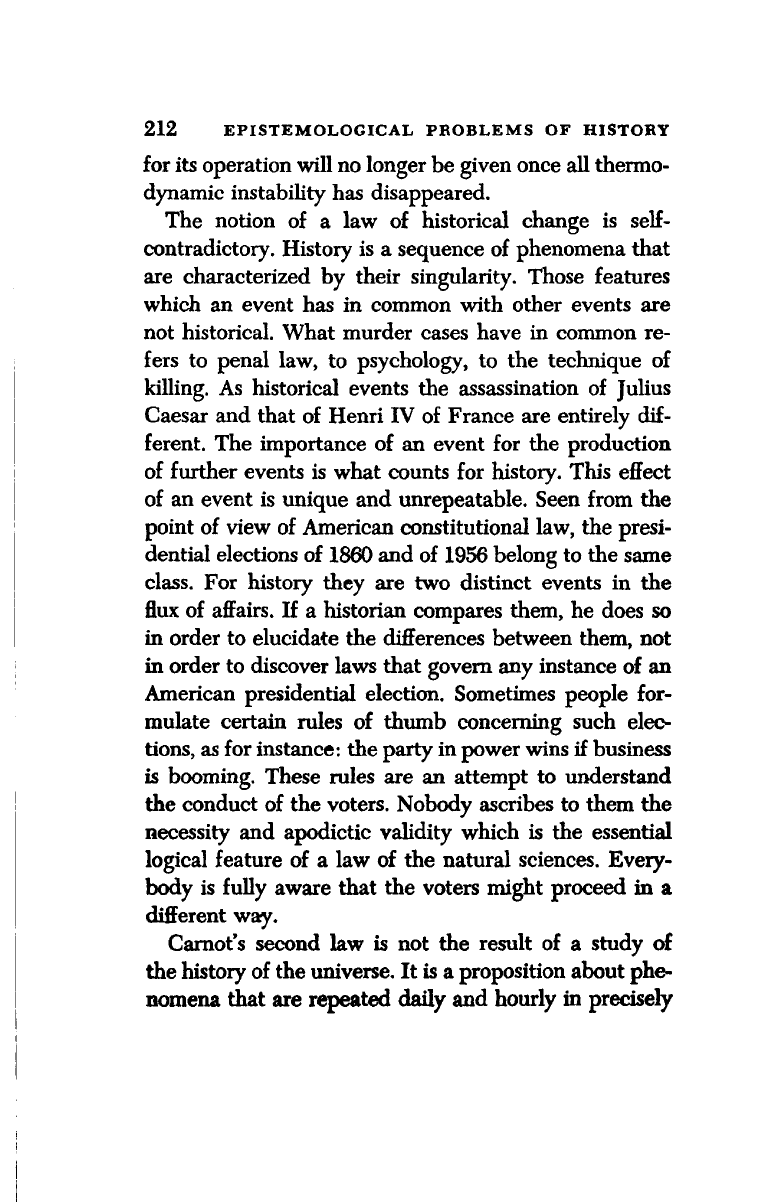
212 EPISTEMOLOGICAL PROBLEMS OF HISTORY
for its operation will no longer be given once all thermo-
dynamic instability has disappeared.
The notion of a law of historical change is
self-
contradictory. History is a sequence of phenomena that
are characterized by their singularity. Those features
which an event has in common with other events are
not historical. What murder cases have in common re-
fers to penal law, to psychology, to the technique of
killing. As historical events the assassination of Julius
Caesar and that of Henri IV of France are entirely dif-
ferent. The importance of an event for the production
of further events is what counts for history. This effect
of an event is unique and unrepeatable. Seen from the
point of view of American constitutional law, the presi-
dential elections of 1860 and of 1956 belong to the same
class.
For history they are two distinct events in the
flux of affairs. If a historian compares them, he does so
in order to elucidate the differences between them, not
in order to discover laws that govern any instance of an
American presidential election. Sometimes people for-
mulate certain rules of thumb concerning such elec-
tions,
as for
instance:
the party in power wins if business
is booming. These rules are an attempt to understand
the conduct of the voters. Nobody ascribes to them the
necessity and apodictic validity which is the essential
logical feature of a law of the natural sciences. Every-
body is fully aware that the voters might proceed in a
different way.
Carnot's second law is not the result of a study of
the history of the universe. It is a proposition about phe-
nomena that are repeated daily and hourly in precisely
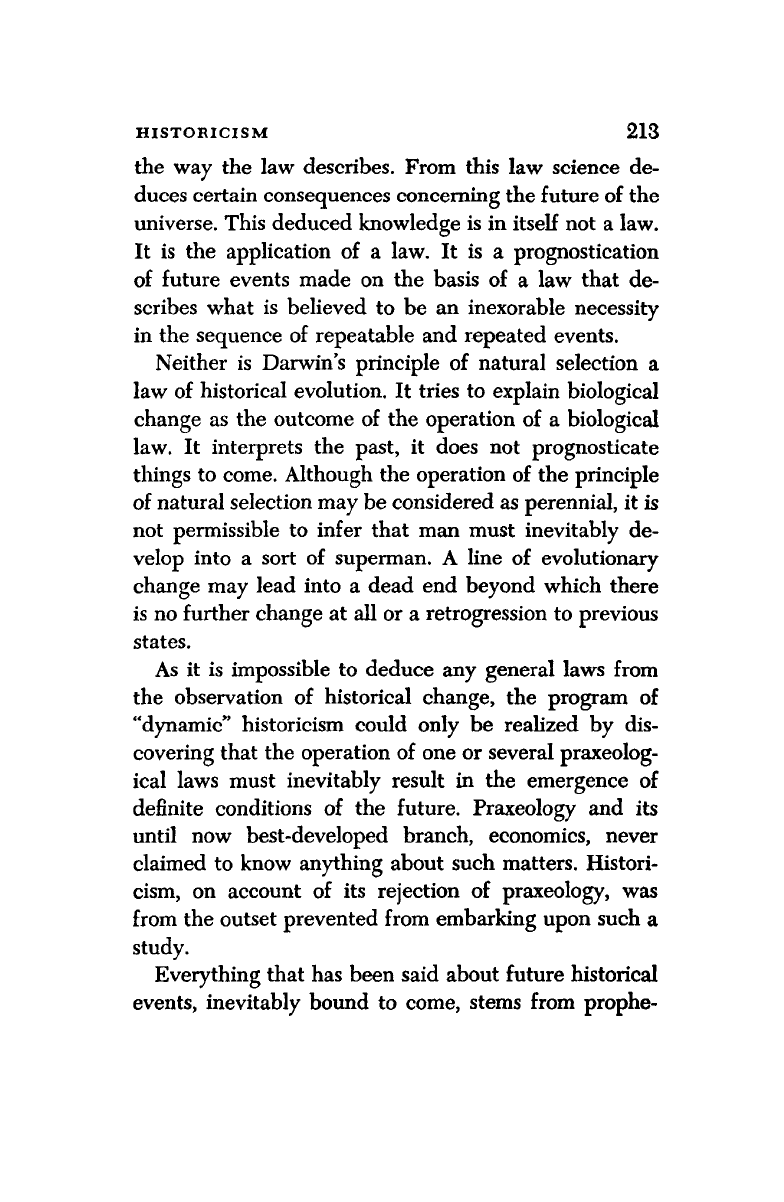
HISTORICISM 213
the way the law describes. From this law science de-
duces certain consequences concerning the future of the
universe. This deduced knowledge is in itself not a law.
It is the application of a law. It is a prognostication
of future events made on the basis of a law that de-
scribes what is believed to be an inexorable necessity
in the sequence of repeatable and repeated events.
Neither is Darwin's principle of natural selection a
law of historical evolution. It tries to explain biological
change as the outcome of the operation of a biological
law. It interprets the past, it does not prognosticate
things to come. Although the operation of the principle
of natural selection may be considered as perennial, it is
not permissible to infer that man must inevitably de-
velop into a sort of superman. A line of evolutionary
change may lead into a dead end beyond which there
is no further change at all or a retrogression to previous
states.
As it is impossible to deduce any general laws from
the observation of historical change, the program of
"dynamic" historicism could only be realized by dis-
covering that the operation of one or several praxeolog-
ical laws must inevitably result in the emergence of
definite conditions of the future. Praxeology and its
until now best-developed branch, economics, never
claimed to know anything about such matters. Histori-
cism, on account of its rejection of praxeology, was
from the outset prevented from embarking upon such a
study.
Everything that has been said about future historical
events, inevitably bound to come, stems from prophe-
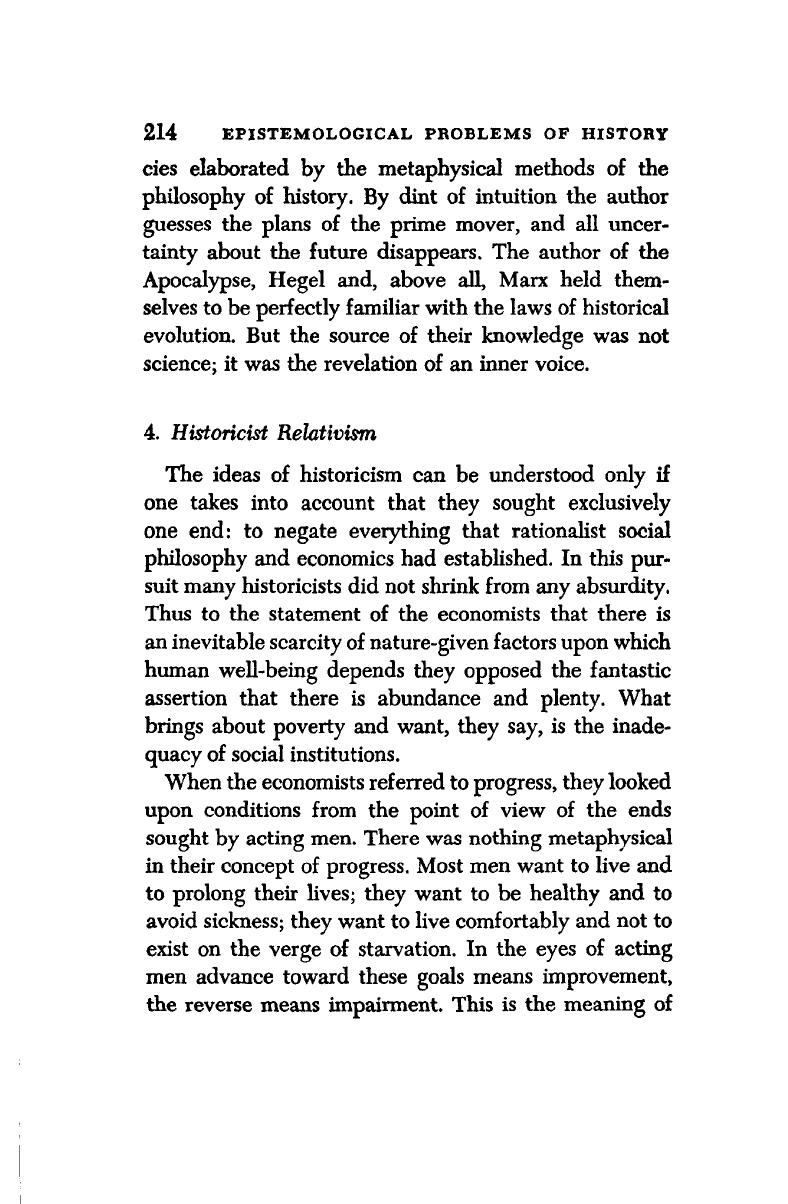
214 EPISTEMOLOGICAL PROBLEMS OF HISTORY
cies elaborated by the metaphysical methods of the
philosophy of history. By dint of intuition the author
guesses the plans of the prime mover, and all uncer-
tainty about the future disappears. The author of the
Apocalypse, Hegel and, above all, Marx held them-
selves to be perfectly familiar with the laws of historical
evolution. But the source of their knowledge was not
science; it was the revelation of an inner voice.
4.
Historicist Relativism
The ideas of historicism can be understood only if
one takes into account that they sought exclusively
one end: to negate everything that rationalist social
philosophy and economics had established. In this pur-
suit many historicists did not shrink from any absurdity.
Thus to the statement of the economists that there is
an inevitable scarcity of nature-given factors upon which
human well-being depends they opposed the fantastic
assertion that there is abundance and plenty. What
brings about poverty and want, they say, is the inade-
quacy of social institutions.
When the economists referred to progress, they looked
upon conditions from the point of view of the ends
sought by acting men. There was nothing metaphysical
in their concept of progress. Most men want to live and
to prolong their lives; they want to be healthy and to
avoid sickness; they want to live comfortably and not to
exist on the verge of starvation. In the eyes of acting
men advance toward these goals means improvement,
the reverse means impairment. This is the meaning of
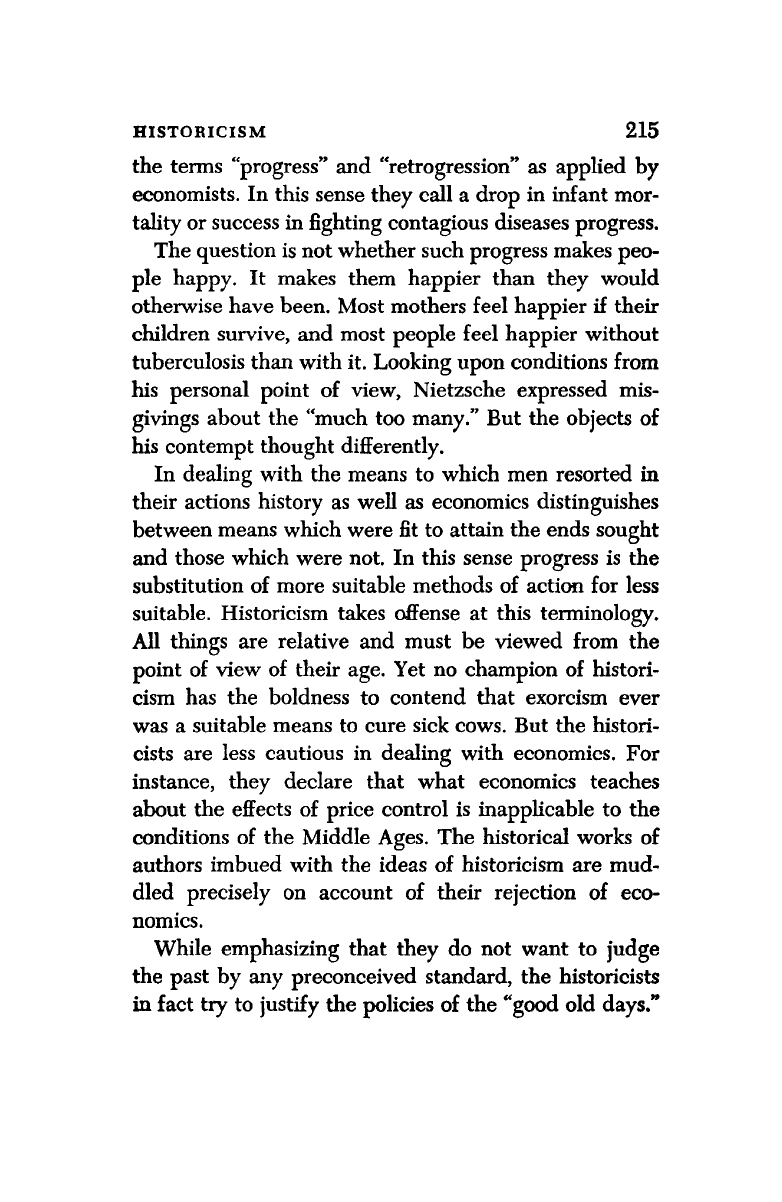
HISTORICISM 215
the terms "progress" and "retrogression" as applied by
economists. In this sense they call a drop in infant mor-
tality or success in fighting contagious diseases progress.
The question is not whether such progress makes peo-
ple happy. It makes them happier than they would
otherwise have been. Most mothers feel happier if their
children survive, and most people feel happier without
tuberculosis than with it. Looking upon conditions from
his personal point of view, Nietzsche expressed mis-
givings about the "much too many/' But the objects of
his contempt thought differently.
In dealing with the means to which men resorted in
their actions history as well as economics distinguishes
between means which were fit to attain the ends sought
and those which were not. In this sense progress is the
substitution of more suitable methods of action for less
suitable. Historicism takes offense at this terminology.
All things are relative and must be viewed from the
point of view of their age. Yet no champion of histori-
cism has the boldness to contend that exorcism ever
was a suitable means to cure sick cows. But the histori-
cists are less cautious in dealing with economics. For
instance, they declare that what economics teaches
about the effects of price control is inapplicable to the
conditions of the Middle Ages. The historical works of
authors imbued with the ideas of historicism are mud-
dled precisely on account of their rejection of eco-
nomics.
While emphasizing that they do not want to judge
the past by any preconceived standard, the historicists
in fact try to justify the policies of the "good old days."
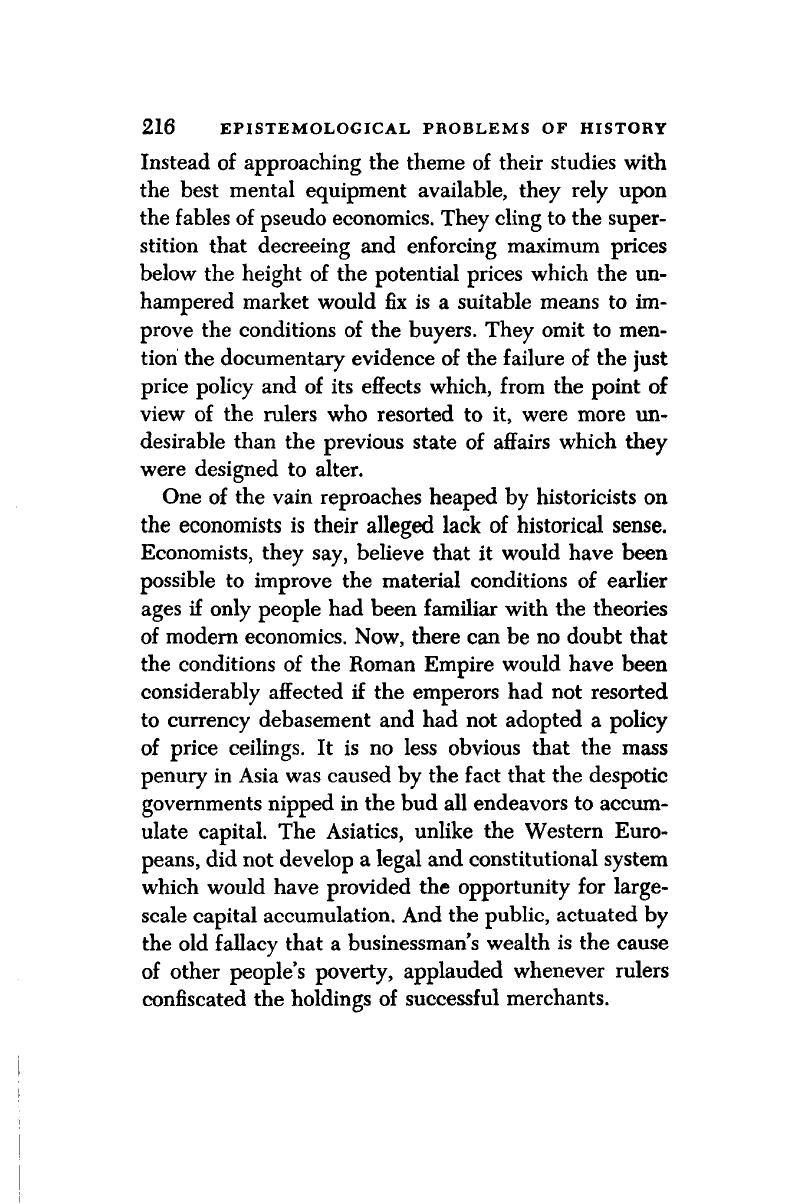
216 EPISTEMOLOGICAL PROBLEMS OF HISTORY
Instead of approaching the theme of their studies with
the best mental equipment available, they rely upon
the fables of pseudo economics. They cling to the super-
stition that decreeing and enforcing maximum prices
below the height of the potential prices which the un-
hampered market would fix is a suitable means to im-
prove the conditions of the buyers. They omit to men-
tion the documentary evidence of the failure of the just
price policy and of its effects which, from the point of
view of the rulers who resorted to it, were more un-
desirable than the previous state of affairs which they
were designed to alter.
One of the vain reproaches heaped by historicists on
the economists is their alleged lack of historical sense.
Economists, they say, believe that it would have been
possible to improve the material conditions of earlier
ages if only people had been familiar with the theories
of modern economics. Now, there can be no doubt that
the conditions of the Roman Empire would have been
considerably affected if the emperors had not resorted
to currency debasement and had not adopted a policy
of price ceilings. It is no less obvious that the mass
penury in Asia was caused by the fact that the despotic
governments nipped in the bud all endeavors to accum-
ulate capital. The Asiatics, unlike the Western Euro-
peans, did not develop a legal and constitutional system
which would have provided the opportunity for large-
scale capital accumulation. And the public, actuated by
the old fallacy that a businessman's wealth is the cause
of other people's poverty, applauded whenever rulers
confiscated the holdings of successful merchants.
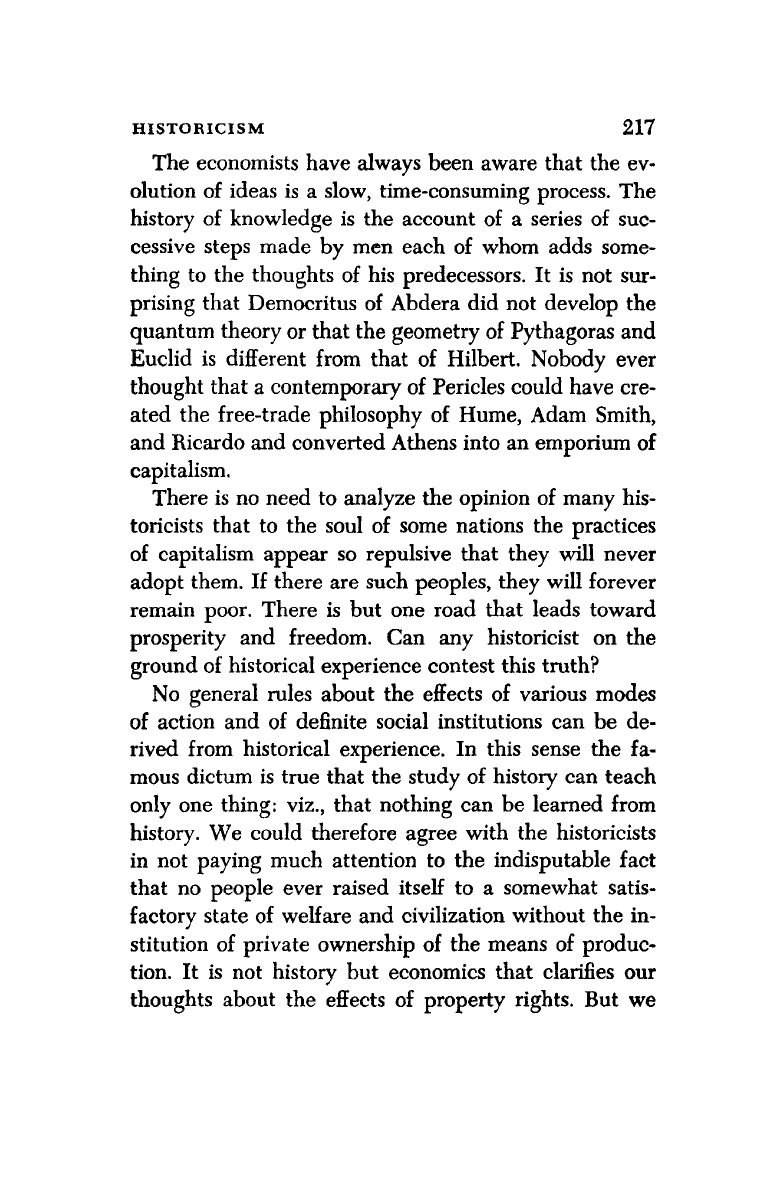
HISTORICISM 217
The economists have always been aware that the ev-
olution of ideas is a slow, time-consuming process. The
history of knowledge is the account of a series of suc-
cessive steps made by men each of whom adds some-
thing to the thoughts of his predecessors. It is not sur-
prising that Democritus of Abdera did not develop the
quantum theory or that the geometry of Pythagoras and
Euclid is different from that of Hilbert. Nobody ever
thought that a contemporary of Pericles could have cre-
ated the free-trade philosophy of Hume, Adam Smith,
and Ricardo and converted Athens into an emporium of
capitalism.
There is no need to analyze the opinion of many his-
toricists that to the soul of some nations the practices
of capitalism appear so repulsive that they will never
adopt them. If there are such peoples, they will forever
remain poor. There is but one road that leads toward
prosperity and freedom. Can any historicist on the
ground of historical experience contest this truth?
No general rules about the effects of various modes
of action and of definite social institutions can be de-
rived from historical experience. In this sense the fa-
mous dictum is true that the study of history can teach
only one thing: viz., that nothing can be learned from
history. We could therefore agree with the historicists
in not paying much attention to the indisputable fact
that no people ever raised itself to a somewhat satis-
factory state of welfare and civilization without the in-
stitution of private ownership of the means of produc-
tion.
It is not history but economics that clarifies our
thoughts about the effects of property rights. But we
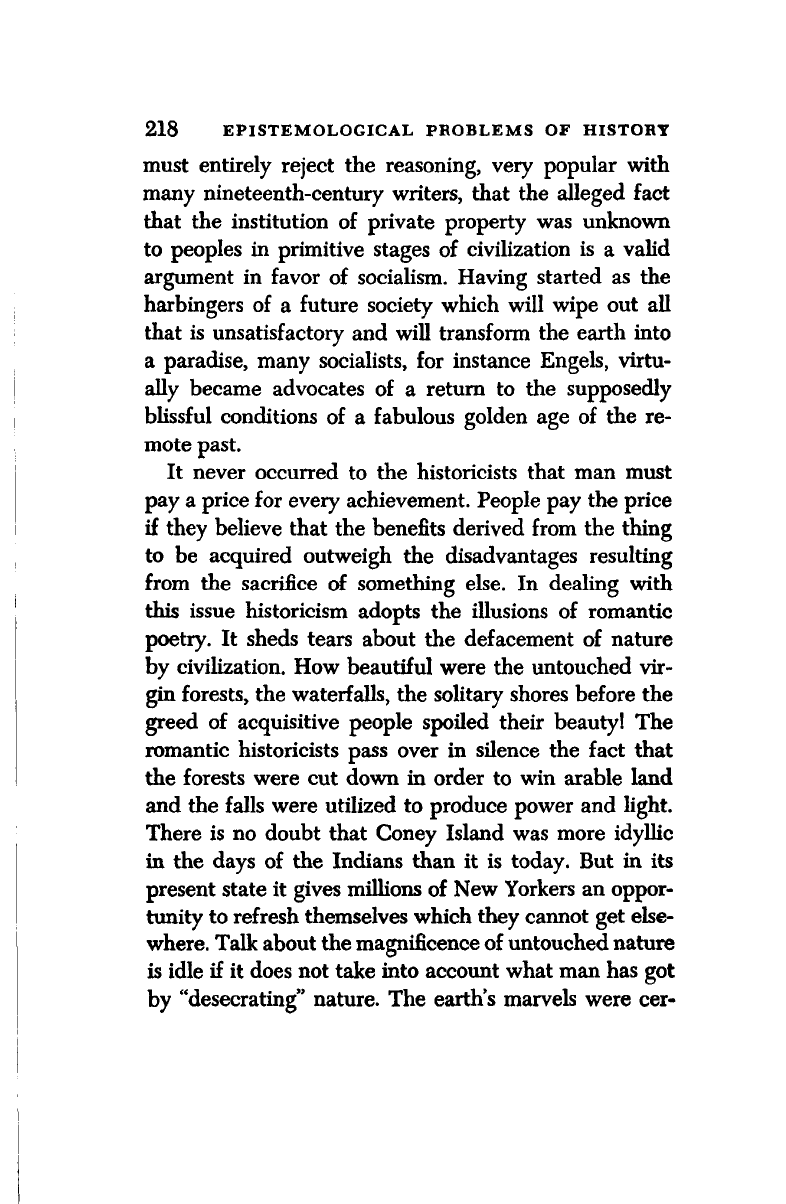
218 EPISTEMOLOGICAL PROBLEMS OF HISTORY
must entirely reject the reasoning, very popular with
many nineteenth-century writers, that the alleged fact
that the institution of private property was unknown
to peoples in primitive stages of civilization is a valid
argument in favor of socialism. Having started as the
harbingers of a future society which will wipe out all
that is unsatisfactory and will transform the earth into
a paradise, many socialists, for instance Engels, virtu-
ally became advocates of a return to the supposedly
blissful conditions of a fabulous golden age of the re-
mote past.
It never occurred to the historicists that man must
pay a price for every achievement. People pay the price
if they believe that the benefits derived from the thing
to be acquired outweigh the disadvantages resulting
from the sacrifice of something else. In dealing with
this issue historicism adopts the illusions of romantic
poetry. It sheds tears about the defacement of nature
by civilization. How beautiful were the untouched vir-
gin forests, the waterfalls, the solitary shores before the
greed of acquisitive people spoiled their beauty! The
romantic historicists pass over in silence the fact that
the forests were cut down in order to win arable land
and the falls were utilized to produce power and light.
There is no doubt that Coney Island was more idyllic
in the days of the Indians than it is today. But in its
present state it gives millions of New Yorkers an oppor-
tunity to refresh themselves which they cannot get else-
where. Talk about the magnificence of untouched nature
is idle if it does not take into account what man has got
by "desecrating" nature. The earth's marvels were cer-
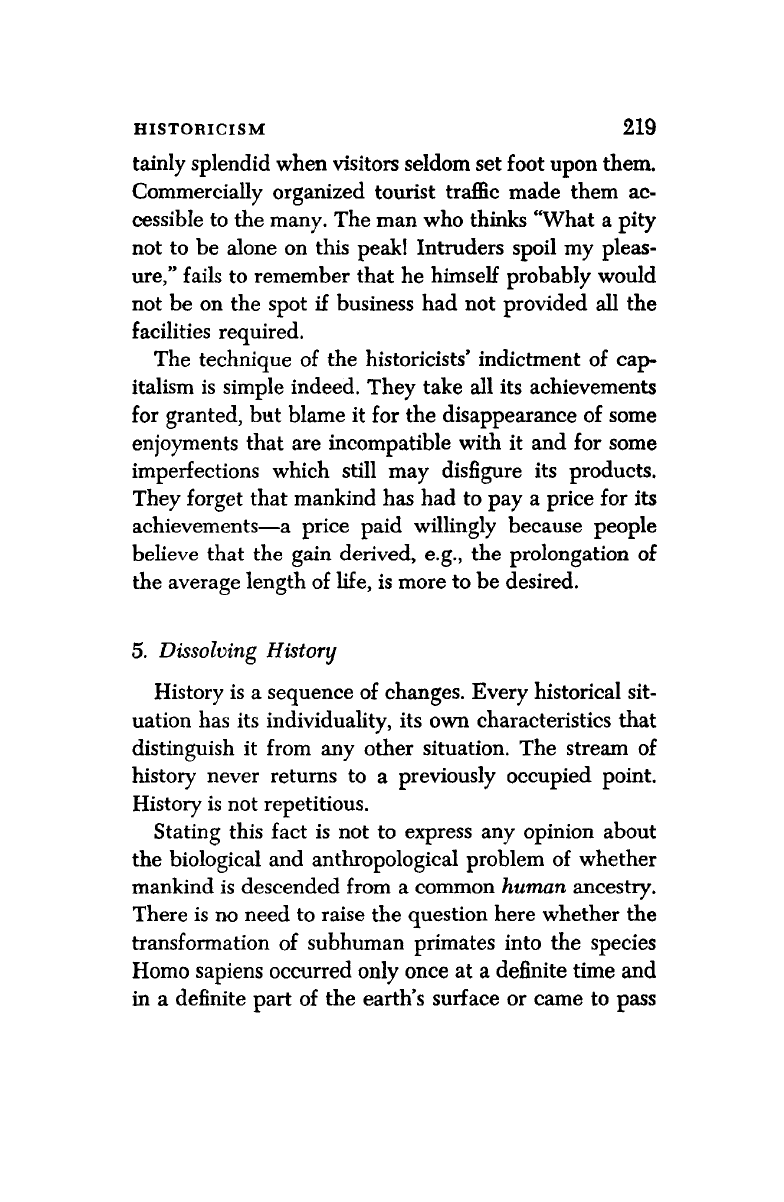
HISTORICISM 219
tainly splendid when visitors seldom set foot upon them.
Commercially organized tourist traffic made them ac-
cessible to the many. The man who thinks "What a pity
not to be alone on this peak! Intruders spoil my pleas-
ure,"
fails to remember that he himself probably would
not be on the spot if business had not provided all the
facilities required.
The technique of the historicists' indictment of cap-
italism is simple indeed. They take all its achievements
for granted, but blame it for the disappearance of some
enjoyments that are incompatible with it and for some
imperfections which still may disfigure its products.
They forget that mankind has had to pay a price for its
achievements—a price paid willingly because people
believe that the gain derived, e.g., the prolongation of
the average length of lif e, is more to be desired.
5. Dissolving History
History is a sequence of changes. Every historical sit-
uation has its individuality, its own characteristics that
distinguish it from any other situation. The stream of
history never returns to a previously occupied point.
History is not repetitious.
Stating this fact is not to express any opinion about
the biological and anthropological problem of whether
mankind is descended from a common human ancestry.
There is no need to raise the question here whether the
transformation of subhuman primates into the species
Homo sapiens occurred only once at a definite time and
in a definite part of the earth's surface or came to pass

220 EPISTEMOLOGICAL PROBLEMS OF HISTORY
several times and resulted in the emergence of various
original races. Neither does the establishment of this
fact mean that there is such a thing as unity of civiliza-
tion.
Even if we assume that all men are scions of a
common human ancestry, there remains the fact that
the scarcity of the means of sustenance brought about
a dispersal of people over the globe. This dispersal re-
sulted in the segregation of various groups. Each of
these groups had to solve for itself man's specific prob-
lem of life: how to pursue the conscious striving after
improvement of conditions warranting survival. Thus
various civilizations emerged. It will probably never be
known to what extent definite civilizations were iso-
lated and independent of one another. But it is certain
that for thousands of years instances of such cultural
isolation existed. It was only the explorations of Euro-
pean navigators and travelers that finally put an end
to it.
Many civilizations came to an impasse. They either
were destroyed by foreign conquerors or disintegrated
from within. Next to the ruins of marvelous structures
the progeny of their builders live in poverty and ig-
norance. The cultural achievements of their forefathers,
their philosophy, technology, and often even their lan-
guage have fallen into oblivion, and the people have
relapsed into barbarism. In some cases the literature of
the extinct civilization has been preserved and, redis-
covered by scholars, has influenced later generations
and civilizations.
Other civilizations developed to a certain point and
then came to a standstill. They were arrested, as Bage-
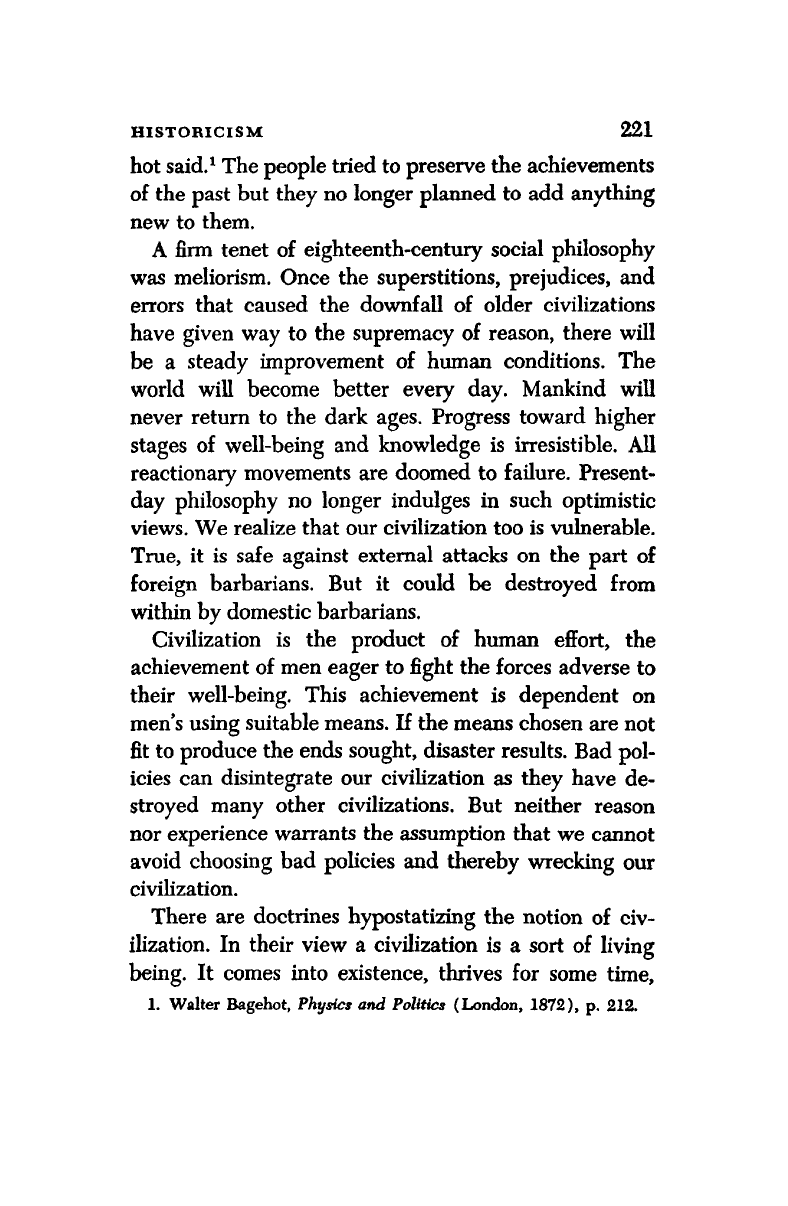
HISTORICISM 221
hot said.
1
The people tried to preserve the achievements
of the past but they no longer planned to add anything
new to them.
A firm tenet of eighteenth-century social philosophy
was meliorism. Once the superstitions, prejudices, and
errors that caused the downfall of older civilizations
have given way to the supremacy of reason, there will
be a steady improvement of human conditions. The
world will become better every day. Mankind will
never return to the dark ages. Progress toward higher
stages of well-being and knowledge is irresistible. All
reactionary movements are doomed to failure. Present-
day philosophy no longer indulges in such optimistic
views.
We realize that our civilization too is vulnerable.
True, it is safe against external attacks on the part of
foreign barbarians. But it could be destroyed from
within by domestic barbarians.
Civilization is the product of human effort, the
achievement of men eager to fight the forces adverse to
their well-being. This achievement is dependent on
men's using suitable means. If the means chosen are not
fit to produce the ends sought, disaster results. Bad pol-
icies can disintegrate our civilization as they have de-
stroyed many other civilizations. But neither reason
nor experience warrants the assumption that we cannot
avoid choosing bad policies and thereby wrecking our
civilization.
There are doctrines hypostatizing the notion of civ-
ilization. In their view a civilization is a sort of living
being. It comes into existence, thrives for some time,
1.
Walter Bagehot, Physics and Politics (London, 1872), p. 212.
